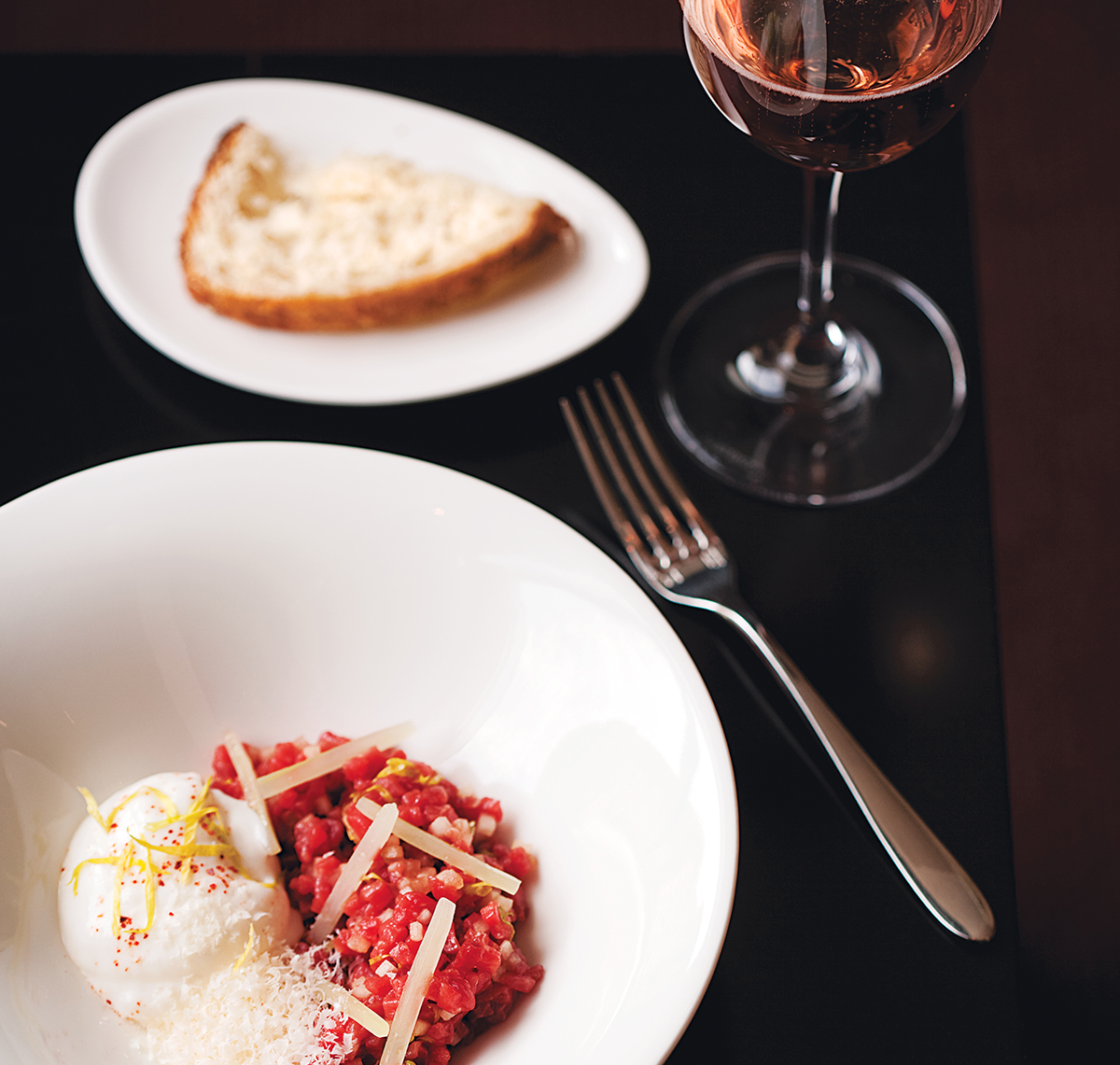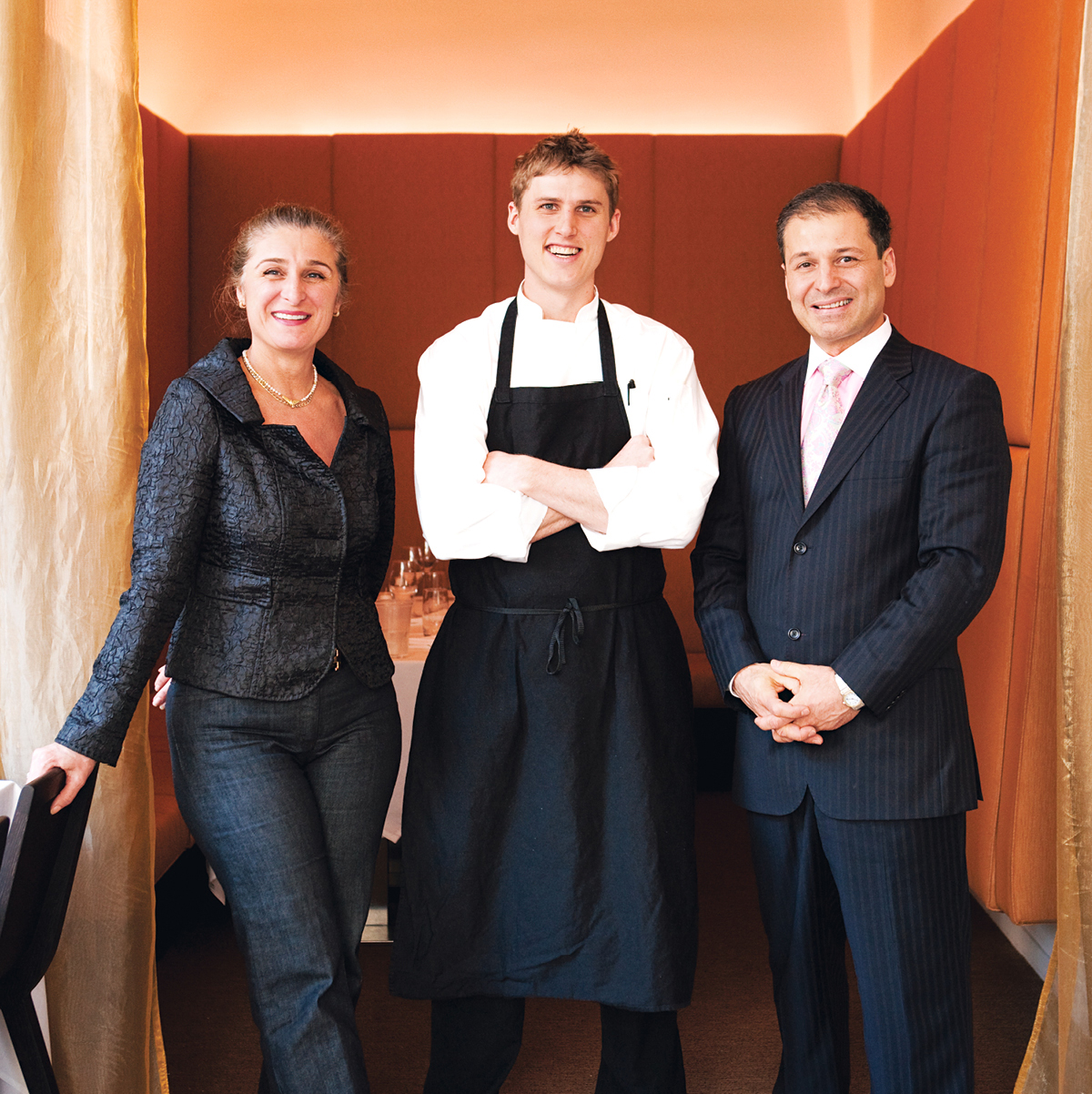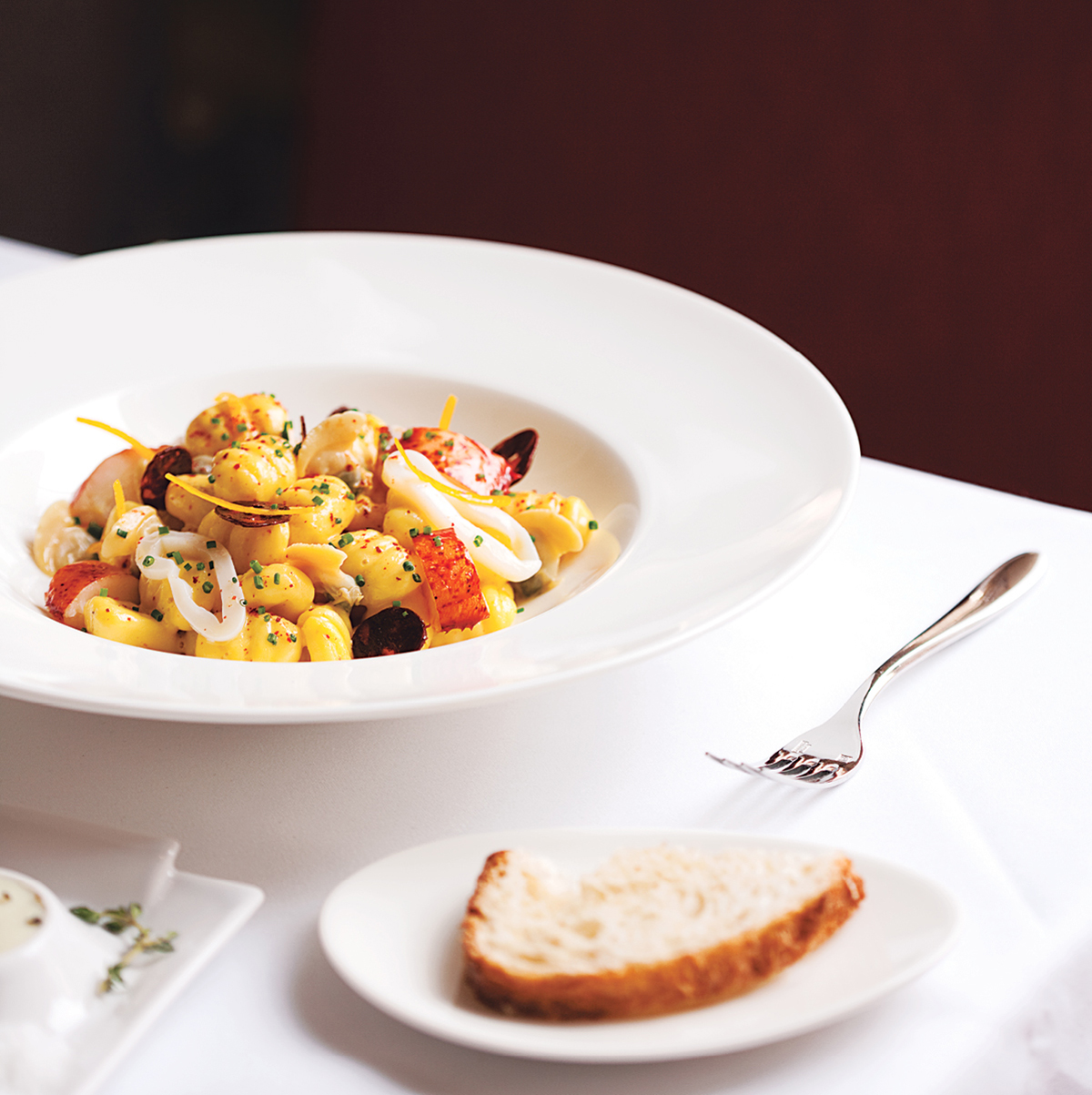Dining Out: Bina Osteria

carne cruda with celery foam. (Photograph by Keller + Keller)
The Binas have style. If you didn’t know it from Lala Rokh, you did from Bin 26 Enoteca, their always-crowded Charles Street wine bar. And now, in a terrible economy, the brother-sister team of Babak Bina and Azita Bina-Seibel, along with executive chef Brian Konefal, have opened their most stylish—and ambitious—restaurant yet: Bina Osteria, a new-wave Italian restaurant in the super-luxurious Ritz-Carlton Towers, incongruously situated between Chinatown and Downtown Crossing.
I’m a longtime and very big fan of the sibs, who are the soul of Beacon Hill and now are redefining downtown hospitality. What I found most unexpected about the cuisine of the new place is its modernity, even if it is built on the simple blocks the pair has long favored—fresh ingredients treated so you taste the quality. Not since Dante de Magistris (first across the street at Blu and now at Cambridge’s Dante) has a kitchen taken off from a base of classic Italian cuisine and risen so high on flights of fancy. I was reflexively wary of the studied novelty of much of what arrived at the table—the prettified presentations, the whimsy, the (gasp!) foams. But I was, for the most part, happily surprised by how it tasted.

Siblings Azita Bina-Seibel, left, and Babak Bina, right, with chef Brian Konefal. (Photograph by Keller + Keller)
The innocent Italian descriptions on the menu belie how out-there some of Konefal’s food is. I got a strong signal with an amuse-bouche, a small cup of lobster consommé with chocolate ganache and Meyer lemon. It sounded awful (lobster with vanilla we’re used to, but chocolate?) but was terrific, the chocolate adding a depth charge to an already-strong broth, the lemon waking it up without being piercing. Here’s a chef I need to know more about, I thought.
The names of most dishes might be Italian, but you don’t expect, say, a celery foam on top of carne cruda, or Italian steak tartare ($15). While the era of foam may have come and gone, Konefal, who trained at a cooking school in Italy’s Piedmont region and worked in fancy French kitchens in New York, hasn’t given it up, and he makes a persuasive case for it. Celery, that underused, pungent flavor, is right with beef, as is the excellent Parmigiano-Reggiano cheese that Konefal employs as seasoning. The tepid foam nicely blankets the cool hand-chopped meat, which is intense with beefy essence from the dry-aging Konefal does in the cellar (he buys grass-fed beef from River Rock Farm in Brimfield). The chef’s sure hand with meat shows in the other standout antipasto, homemade coppa di testa ($11), a pig’s-head sausage with sweet Spanish peppers, tomato chutney, and fennel with Pernod. (If pig’s head makes you squeamish, you might take some comfort in the fact that all the pork is from New England farms.) It’s like a crumbly meatloaf with a slightly smoky flavor and a lightly peppery and sweet sauce.
Then come primi, the category most people hunger for in Italian restaurants: the pastas. Here’s where Konefal’s French training made me especially nervous, as anyone who’s tasted flat, gluey Bolognese in a Parisian bistro trying to go lusty will understand. Yet the must-have Bina primo, gnocchi ($17 for a half portion, $29 for a full), is from a secret recipe originally by the Swiss god Frédy Girardet and learned by Konefal at Eleven Madison Park, the French-technique restaurant he worked at before going to the even French-er L’Atelier de Joël Robuchon. And it’s almost pure butter. Italians simply bind mashed potatoes with eggs to make dough for tiny dumplings; this recipe is what Konefal describes as a warm “emulsified dough,” served with a mounted butter sauce. The chef adds Meyer lemon to cut the richness, and chorizo, calamari, and clams for some texture—but you’ll ignore them, because those gnocchi are miraculously light, and no matter how many you eat you want more.

Gnocchi with Meyer lemon, calamari, clams, and chorizo. (Photograph by Keller + Keller)
Other homemade pastas aren’t as memorable, though. The spaghetti carbonara ($15/$27), with house-cured pancetta and a nice slow-cooked egg, features a pecorino foam that’s salty and cheesy and decidedly unpersuasive. And Konefal’s reach can exceed his grasp in the mains, as in the lobster tail ($31) treated like a pork roast, wrapped in lardo and seasoned with garlic, rosemary, and thyme, the meat salty and barely recognizable.
Meats are Konefal’s territory (fish was undercooked and bland, vegetables were perfunctory), and the two exceptional entrées share tender, moist meat and marvelous crisp skin: crispy suckling pig confit ($33) and a variation on chicken Marsala ($29). The confit, a pressed square of young pig slowly cooked in duck fat and topped with a flat crackling, is pretty fabulous excess. And the chicken is essence of fowl and mushrooms, with cipollini purée heightening the sweetness of reduced Marsala.
Desserts, by Paola Fioravanti, Konefal’s wife, are a bit too new-wave for my taste, but some of them are original and good, particularly the hazelnut ice cream with a chocolate Kit Kat–like wafer ($11) and a moscato mousse ($11) made from the fizzy Piedmont wine, with orange sorbet and crushed-sumac meringue. Like much of the lineup at Bina Osteria, the moscato mousse is an odd mix of familiar and not. And, as with the other high points of the menu, when you go along for the ride you can be carried away.

Moscato mousse with orange sorbet and crushed-sumac meringue. (Photograph by Keller + Keller)
Corby’s Picks
Appetizers: Carne cruda with celery foam and Parmigiano-Reggiano ($15); gnocchi with Meyer lemon, calamari, clams, and chorizo ($17)
Entrées: Chicken Marsala with cipollini purée ($29); crispy suckling pig confit ($33)
Desserts: Hazelnut ice cream with a chocolate wafer ($11); moscato mousse with orange sorbet and crushed-sumac meringue ($11)
Bina Osteria, 581 Washington St., Boston, 617-956-0888, binaboston.com
Critic Corby Kummer—an editor at The Atlantic and author of The Pleasures of Slow Food—has been reviewing Greater Boston’s top restaurants in our pages since 1997.


